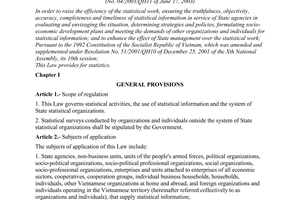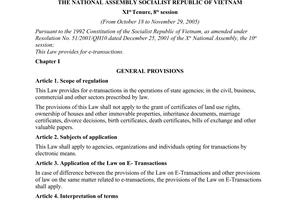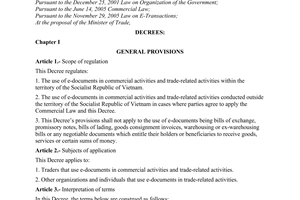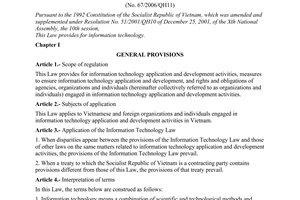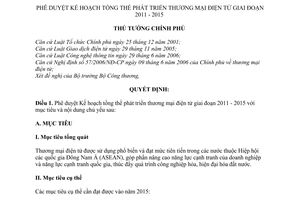Nội dung toàn văn Decision No. 1073/QD-TTg approving the master plan on e-commerce development
|
THE
PRIME MINISTER |
SOCIALIST
REPUBLIC OF VIET NAM |
|
No. 1073/QD-TTg |
Hanoi, July 12, 2010 |
DECISION
APPROVING THE MASTER PLAN ON E-COMMERCE DEVELOPMENT DURING 2011-2015
THE PRIME MINISTER
Pursuant to the December 25,
2001 Law on Organization of the Government;
Pursuant to the November 29, 2005 Law on E-Transactions;
Pursuant to the June 29, 2006 Law on Information Technology;
Pursuant to the Government's Decree No. 57/ 2006/ND-CP of June 9, 2006, on
e-commerce;
At the proposal of the Minister of Industry and Trade,
DECIDES:
Article 1. To approve the master plan on e-commerce development during 2011-2015 with the following principal objectives and contents:
A. Objectives
I. General objectives
E-commerce will become common and reach the advanced level of the members of the Association of Southeast Asian Nations (ASEAN), contributing to improving the competitiveness of enterprises and the nation, thereby accelerating the process of national industrialization and modernization.
II. Specific objectives
Specific objectives set forth for 2015 include:
1. All large-sized enterprises will conduct e-commerce transactions in the form of business-to-business, of which:
a/ 100% will use e-mails in their production and business operations;
b/ 80% will have websites regularly updated with information on their operation and product advertisements;
c/ 70% will join websites for goods sale (below referred to as e-commerce websites) for trading of goods and services related to their production and business operations;
d/ 5% will join e-business networks to exchange e-documents according to the standard of e-data interchange;
e/ 20% will apply special-use software to their production and business management;
f/ To form a number of online commodity exchanges for products made in Vietnam which are of high marketability in the world;
g/ To found a number of large-sized enterprises to provide e-commerce services with prestige at home and in the region.
2. All small- and medium-sized enterprises will conduct e-commerce transactions in the form of business-to-consumer or business-to-business, of which:
a/ 100% will use e-mails in their production and business operations;
b/ 45% will have websites regularly updated with information on their operation and product advertisements;
c/ 30% will join e-commerce websites for trading of goods and services related to their production and business operations.
3. Facilities to assist consumers in participating in e-commerce in the form of business-to-consumer will be initially formed, with which:
a/ 70% of modern supermarkets, shopping malls and distribution centers will accept non-cash payments made by consumers to purchase goods;
b/ 50% of providers of electricity, water, telecommunications and communications services will accept service charge payments made by households electronically;
c/ 30% of business establishments in such sectors as transportation, culture, sports and tourism will develop channels for e-transactions with consumers.
4. Most public services related to production and business operations will be provided online. of which:
a/ 80% of import- and export-related public services will be provided online at level 3 or higher levels before 2013 and 40% of these services will reach level 4 by 2015;
b/ E-customs procedure services will be provided online at level 3 or higher levels before 2013;
c/ Tax-related services, including value-added tax and personal income tax payment declarations, will be provided online at level 3 or higher levels before 2013;
d/ Business and investment registration procedure services, including grant of enterprise registration certificates, investment certificates and certificates of branch or representative office operation registration, will be provided online at level 3 or higher levels before 2013;
e/50% of public services related to commerce and production and business operations will be provided online at level 3 or higher levels before 2014. By 2015. 20% of these services will reach level 4.
B. Contents
I. Perfection of the system of legal documents on e-commerce
To review and revise existing relevant policies and legal documents and promulgate new ones to support and facilitate the development of e-commerce and make it conformable with international practice and Vietnam's international commitments.
1. Legal documents concerning recognition of the legality of e-documents, including:
a/ Legal documents recognizing the legality of invoices and accounting documents in electronic form which satisfy specific criteria for use by enterprises in performing tax and accounting operations upon organizing online trading of goods or provision of services;
b/ Legal documents recognizing the legality of dossiers, applications and written certifications in electronic form which satisfy specific criteria for use by enterprises in performing part of or the whole process of business registration, investment registration or procurement bidding via electronic means;
c/ Legal documents recognizing the legality of written contracts on goods trading or service provision, permits, licenses or other certifications in electronic form, which satisfy specific criteria. to facilitate international trading and organize paperless trading.
2. Legal documents defining the provision of e-commerce services as a business line with a separate registration code.
3. Legal documents on taxation:
a/ Policies and legal documents providing value-added tax and enterprise income lax incentives in order to create a favorable environment for enterprises engaged in e-commerce and to encourage consumers to conduct online trading;
b/ Regulations on product headings and dutiable values applicable to export or import of digitalized products in compliance with international practice and Vietnam's international commitments.
4. Legal documents on consumer protection: regulations on consumer protection and assurance of legal protection of consumers in e-commerce transactions according to international standards as in conventional trading transactions.
5. Legal documents on management of e-commerce websites: regulations on registration and management of e-commerce websites based on a transparent and competitive business environment.
6. Legal documents on information safety:
a/ Legal documents on information safety in e-commerce transactions;
b/ National standards and technical regulations, which are applicable to parties to e-commerce transactions, suitable to transaction size, and conformable to national and international standards;
c/ Legal documents on protection of personal information in compliance with relevant laws, ensuring that personal information in e-commerce transactions is protected by law according to international standards and Vietnam's international commitments.
7. Legal documents on settlement of disputes and handling of violations in e-commerce:
a/ Legal documents providing for the legality of e-documents used as evidence;
b/ Legal documents on settlement of disputes by arbitration in c-commerce. covering a mechanism for online settlement of disputes;
c/ Penalties for violations of the law on e-commerce; competence and mechanism for inspection, examination, and handling of administrative violations in e-commerce by state management agencies in charge of e-commerce;
d/ Inclusion of hi-tech crimes and e-commerce-related crimes in the Penal Code.
8. Other legal documents:
a/ Legal documents on intellectual property, which are conformable to international practice and able to facilitate the development of e-commerce;
b/ Legal documents governing subjects emerging in e-commerce;
c/ Policies and legal documents promoting the provision of online services;
d/ Policies and legal documents for realizing models of online payment.
II. Development of human resources for e-commerce
1. To conduct public information work to improve public awareness about benefits of e-commerce:
a/To develop programs on training of central and local economic management personnel and programs on intensive retraining of specialized e-commerce officers;
b/ To publicly inform benefits and skills of application of e-commerce to enterprises and consumers of major production or service sectors; to advertise typical enterprises which have succeeded in applying e-commerce and providing e-commerce services.
2. To step up formal training in e-commerce:
a/ To promulgate a framework program on e-commerce training for universities, colleges and professional secondary schools; to intensify the teaching of skills of applying e-commerce in vocational schools;
b/ To apply online e-commerce training in the direction of promoting investment in developing the online training technology, assisting universities and enterprises in joining partnerships for designing online training curricula and courses. To provide financial supports and tax incentives for online e-commerce training to develop.
III. Online provision of public services related to production and business operations
To intensify the online provision of public services related to production and business operations in accordance with international commitments on paperless trading in the following sectors:
1. Taxation, customs, export, import, investment, business registration and other public services directly related to production and business operations.
2. Online provision of information on foreign markets in Vietnamese to Vietnamese enterprises and information on the Vietnamese market in English and a number of common foreign languages to foreign enterprises.
3. Exchange of e-documents related to management of the export or import of goods and services with foreign parties.
4. Provision of information on state-funded projects, information on bidding for governmental procurements and step-by-step organization of online bidding for governmental procurements:
a/ Before 2012, all state agencies from the central to local level shall upload information on state-funded projects and information on bidding for governmental procurements onto their websites or functional agencies' websites;
b/ By the end of 2015, all bidding plans, bid invitations, bidding results, lists of participating bidders shall be publicized on the national bidding network; around 20% of bid packages for state-funded goods procurement, construction and installation, and consultancy services shall be conducted online; and the mode of centralized government procurement shall be piloted on the national bidding network.
5. Public disclosure of information on enterprises and their production or business operations:
a/ To publicly disclose information on enterprises and facilitate other enterprises1 access to such information through a database on registration of establishment, division, separation, merger, dissolution and bankruptcy of enterprises; a tax database; a database on export and import management covering customs declaration, certificate of origin and import licensing; and a database on market and competition management;
b/ To interlink databases on enterprises of the Ministry of Finance, the Ministry of Planning and Investment, the Ministry of Industry and Trade and other concerned ministries and sectors before 2015.
IV. Development and application of e-commerce technologies and services
1. To promulgate policies and measures to promote investment in technology development and transfer to support e-commerce:
a/ Policies to encourage enterprises to use open-source software upon utilizing e-commerce applications;
b/ Policies and solutions to encourage consumers to trade in digitalized products online; and to further develop e-commerce and the digital content industry;
c/To encourage organizations and enterprises to provide services of leasing calculating devices, software and other information technology and telecommunications services;
d/ To promote the development of mobile commerce and digitalized services provided via mobile terminal equipment (cell phones, PDA, pocket PC, etc.);
e/ To promote technology research and transfer for developing online payment; to encourage enterprises to develop convenient e-payment facilities for consumers.
2. Development of integrated services based on advanced technologies:
a/ To promote the commercial provision of services based on the Geographical Information System (GIS) or the Global Positioning System (GPS);
b/ To research, develop and transfer technologies which can be largely used in commercial activities (radio frequency identification (RFID), numerical and bar code, smart card, etc.).
3. Promulgation and dissemination of standards and regulations applicable to e-commerce:
a/ National standards and technical regulations on standard exchange of e-data applicable to e-commerce to be disseminated among enterprises and organizations providing e-commerce training;
b/ Pilot provision of supports for a number of enterprises in applying the standard exchange of e-data in their production or business operations in order to create an e-business network among these enterprises and multiply the model of e-business network among many enterprises.
4. Development of commercial activities based on the card technology in mass transit, distribution, cultural, sport, entertainment and tourist services.
5. Organization of activities for information safety in e-commerce transactions according to objectives and solutions set forth in the national plan on development of digital information safety.
a/ To improve the awareness of parties to e-commerce transactions about the importance of information safety, their benefits, obligations and responsibilities for assuring information safety as well as benefits of use of digital signatures and digital signature certification services in e -commerce;
b/ To develop providers of public digital signature certification services to achieve the target that by 2015 some Vietnamese organizations will be accredited by prestigious foreign digital signature certification organizations;
c/ To develop providers of e-commerce website certification services; to encourage organizations, enterprises and individuals to apply advanced information confidentiality technologies so as to assure the safety of information exchanged in the computer network environment;
d/ To step up the grant of trustworthy e-commerce website certificates so that by 2015 at least 5% of e-commerce websites will be granted such certificate: to popularize the benefits of this activity for enterprises and consumers; to encourage organizations which grant trustworthy e-commerce website certificates to cooperate and exchange experience with foreign organizations granting trustworthy e-commerce website certificates and give mutual recognition of trust mark.
V. Improvement of state management effectiveness and capacity
1. Improving the capacity of local authorities for state management of e-commerce:
Provincial-level People's Committees shall direct local functional agencies in enhancing state management of e-commerce; taking the initiative in creating a favorable environment for local enterprises to apply e-commerce; provide greater supports for enterprises in applying e-commerce to advertising, marketing and introduction of their products, participation in online transactions, renewal of trading methods and reform of management processes.
2. Building a contingent of professionally qualified personnel for state management of e-commerce at central and local levels. Regularly organizing refresher courses for, and adopting plans on intensive training of provincial-level department officers in charge of e-commerce to improve their knowledge; intensifying the exchange and study of e-commerce experience of developed countries, and entering into cooperation with these countries in programs on training of e-commerce human resources for state management agencies.
3. Formulating an appropriate mechanism and apparatus to promptly settle disputes and problems arising from e-commerce; raising the capacity of the law enforcement apparatus to promptly handle violations in e-commerce.
a/ To assist providers of trustworthy e-commerce website certification services in establishing a process and apparatus for dispute settlement under current laws and international practice;
b/ To encourage the Vietnam E-Commerce Association and other socio-professional organizations to take part in various forms of dispute settlement through conciliation and to comply with law, with a view to protecting the lawful interests of consumers;
c/ To raise capacity of commercial arbitrators;
d/ To set up a specialized e-commerce inspectorate;
e/ To train and improve professional qualifications of police officers, court and procuracy personnel so that they can lawfully handle e-commerce-related violations.
4. Making statistics on e-commerce and activities in support of e-commerce:
a/ To promulgate before 2012 criteria for and methods of making statistics on e-commerce under the Law on Statistics. To consolidate organizational structures of statistical offices from the central to local level to start making statistics on e-commerce;
b/ From 2012 on, to publish a white paper on c-commerce in Vietnam with statistics on application of e-commerce nationwide in order to support the state management, business operations and international integration in e-commerce;
c/ To assist the Vietnam E-Commerce Association and other socio-professional organizations in developing an index of readiness to apply e-commerce by enterprises and localities and ranking e-commerce websites.
5. Intensifying international cooperation in e-commerce:
a/ To actively participate in international cooperation in e-commerce and relevant areas with international or regional economic and trade organizations, the United Nations' trade organizations, multilateral or bilateral trade organizations, and other trade partners:
b/ To encourage socio-professional organizations and enterprises to cooperate with foreign partners in creating an environment for development of international e-commerce. intensifying activities of cross-border online business and technology transfer.
6. Stepping up the formulation of policies, programs and general projects to assist the business community in going online, developing online brands, organizing e-marketing. etc.. in order to help enterprises change production or trading methods and apply advanced management and administration methods.
7. Awarding a national prize on e-commerce and using the e-commerce development criterion in evaluating and ranking the competitiveness of provinces and centrally run cities.
8. Assuring information uniformity and accessibility among ministries and sectors in their state management of enterprises, and eventually establishing national databases for common use in the fields of customs, taxation, business administration, import and export management, finance and credit, and statistics. Sharing information on Internet resources between the Ministry of Information and Communications and the Ministry of Industry and Trade in order to enhance the state management of e-commerce websites.
C. Funding sources for implementation
I. Funds for implementation of this master plan will come from the state budget, enterprises contributions, loans provided by credit institutions, international aid and other lawfully raised funds as prescribed by law.
II. The state budget
source shall be decentralized under current regulations on state
budget decentralization, specifically as follows:
1. Funds for projects and tasks which constitute expenditure items of ministries, ministerial-level agencies and government-attached agencies will be allocated by the central budget and incorporated in annual budget expenditure estimates of these ministries and agencies.
2. Funds for projects and tasks which constitute expenditure items of provincial-level People's Committees shall be allocated by local budgets and incorporated in annual local budget estimates.
Article 2. Organization of implementation
1. The master plan on e-commerce development shall be implemented in line and compliance with strategies, master plans and plans on development of the industry and trade sector and other economic sectors, especially export, distribution and other services; strategies, master plans, plans, schemes and programs on development and application of information and communications technologies: programs on administrative reform and application of information technology to operations of state agencies.
2. Based on this master plan, ministries, ministerial-level agencies, government-attached agencies and provincial-level People's Committees shall:
a/ Elaborate, appraise, approve and allocate budget estimates according to current regulations on power decentralization for implementation of their own e-commerce development plans during 2011-2015; and annually send these budget estimates to the Ministry of Industry and Trade before December 31 for summarization and reporting to the Prime Minister;
b/ Inspect, assess and report on an annual or irregular basis on the implementation of this master plan under the guidance and requirements of the Ministry of Industry and Trade for summarization and reporting to the Prime Minister.
3. The Ministry of Industry and Trade shall:
a/ Assume the prime responsibility for, and coordinate with ministries, ministerial-level agencies, government-attached agencies and provincial-level People's Committees in, organizing the implementation of this Decision, and annually review the implementation, propose implementation measures which fall beyond its competence to the Prime Minister for decision, and finally review the implementation in the year of completion of the master plan;
b/ Revise legal documents on import and export business in the direction of recognizing the legality of e-documents; promulgate legal documents detailing the law on consumer protection and relevant legal documents in order to protect consumers in e-commerce;
c/ Promulgate or revise regulations on registration and management of e-commerce websites; policies and legal documents to encourage the online provision of services;
d/ Assume the prime responsibility for, and coordinate with concerned ministries and branches in, studying and proposing the promulgation of legal documents to regulate subjects newly emerging from e-commerce activities;
e/ Intensify the online provision at level 3 or higher levels of import and export procedure services and other commerce-related public services;
f/ Assume the prime responsibility for, and coordinate with provincial-level People's Committees, the Vietnam Chamber of Commerce and Industry, the Vietnam E-Commerce Association and other socio-professional organizations in, organizing the public information of e-commerce; study and develop e-commerce models and encourage enterprises to participate in e-commerce.
4. The Ministry of Information and Communications shall:
a/ Coordinate with the Ministry of Industry and Trade in organizing the implementation of this master plan in harmony with strategies, master plans, plans, schemes and programs on development of information and communications technologies, and combine development of e-commerce with that of an e-government;
b/ Promulgate policies and measures to promote investment in technology development and transfer in support of e-commerce;
c/ Step up the provision of digital signature and e-commerce website certification services;
d/ Assume the prime responsibility for, and coordinate with the Ministry of Industry and Trade and the Ministry of Public Security in, taking measures to assure information safety in e-commerce transactions.
5. The Ministry of Planning and Investment shall:
a/ Assume the prime responsibility for, and coordinate with the Ministry of Industry and Trade in, allocating annual development investment funds to ministries, ministerial-level agencies and government-attached agencies for implementing projects and performing tasks specified in this master plan; and send annual allocation estimates to the Ministry of Finance for summarization under the State Budget Law;
b/ Revise legal documents on investment and business registration in the direction of recognizing the legality of dossiers in electronic form;
c/ Intensify the online provision at level 3 or higher levels of services of carrying out business and investment registration and other procedures related to production or business operations of enterprises;
d/ Revise the list of business lines for use in the business registration of various forms of e-commerce service provision;
e/ Assume the prime responsibility for implementing projects on application of e-commerce to governmental procurements; perfect the legal framework on online bidding, and coordinate with ministries, sectors and localities in organizing online bidding for governmental procurements.
6. The Ministry of Finance shall:
a/ Assume the prime responsibility for, and coordinate with the Ministry of Industry and Trade in. allocating annual funds to ministries, ministerial-level agencies and government-attached agencies for implementing projects and performing tasks specified in this master plan; then summarize and propose annual allocation estimates to a competent authority for decision under the State Budget Law;
b/ Revise legal documents on finance in the direction of recognizing the legality of invoices and accounting documents in electronic form;
c/ Review, revise or promulgate legal documents on taxation to create a favorable environment for enterprises conducting e-commerce and encourage consumers to conduct online trading;
d/ Assume the prime responsibility for. and coordinate with concerned ministries and sectors in. revising regulations on product codes and dutiable values of imported or exported digitalized products in conformity with international practice and Vietnam's international commitments;
e/ Intensify the online provision at level 3 or higher level of customs and tax services and services of carrying out procedures related to production or business operations of enterprises.
7. The Ministry of Education and Training shall assume the prime responsibility for, and coordinate with concerned ministries and sectors in, formulating and promulgating framework programs on e-commerce training in universities, colleges and professional secondary schools; adopting policies to promote formal e-commerce training in universities and colleges and associating training with practical production or business operations of enterprises.
Article 3. This Decision takes effect on the date of its signing.
Article 4. Ministers, heads of ministerial-level agencies and government-attached agencies, and chairpersons of provincial-level People's Committees shall implement this Decision.-
|
|
FOR
THE PRIME MINISTER |



